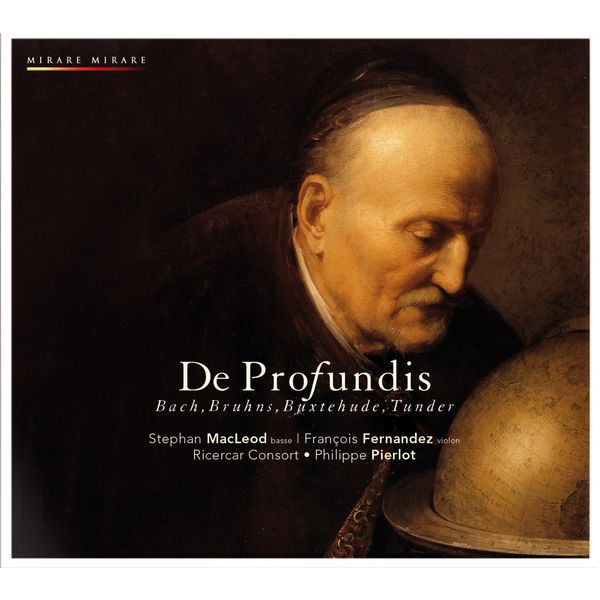
Musik-Streaming
Hören Sie dieses Album mit unseren Apps in hoher Audio-Qualität
Testen Sie Qobuz kostenlos und hören Sie sich das Album anHören Sie dieses Album im Rahmen Ihres Streaming-Abonnements mit den Qobuz-Apps
Abonnement abschließenHören Sie dieses Album im Rahmen Ihres Streaming-Abonnements mit den Qobuz-Apps
Download
Kaufen Sie dieses Album und laden Sie es in verschiedenen Formaten herunter, je nach Ihren Bedürfnissen.
The solo cantata repertory of northern Germany in the late seventeenth century took a long time to reach the realm of recordings, and now that it has it is regularly yielding new treasures. Various works by Dietrich Buxtehude have been recorded; here he is represented by a single work and is joined by his student Nikolaus Bruhns and his father-in-law, Franz Tunder. The pieces evolved in the direction of simplicity and intensity, under the influence of the religious ideas collectively known as Pietism. Italian aria styles with their regular structure and smooth melodies made their way across Germany during this period, only to be met by German poetry and its assortment of rules and rhetorical figures. The collision resulted in a level of creative tension that generated deeply felt works in a region devastated by war. The flavor of the music is given right out of the blocks in the title track, Bruhns' De Profundis (track 1), with its spectacular rising melisma at the words "De profundis clamavit" (Out of the depths I have cried). The booklet identifies some of the rhetorical figures found in the music throughout; their effect is not to restrict the music but to intensify it. Swiss-born bass Stephan MacLeod delivers power on a small musical scale, and the Ricercar Consort, featuring director François Fernandez on the violino piccolo, brings warmth and intimacy on historical instruments. This music was ignored perhaps because it does not lead directly to Bach, but it has a great deal to tell the listener about German Protestantism and its musical impulses. A superb disc of solo sacred music. Notes are in French, English, and German.
© TiVo
Sie hören derzeit Ausschnitte der Musik.
Hören Sie mehr als 100 Millionen Titel mit unseren Streaming-Abonnements
Hören Sie diese Playlist und mehr als 100 Millionen Tracks mit unseren Streaming-Abonnements
Ab 12,49€/Monat

Albumbeschreibung
The solo cantata repertory of northern Germany in the late seventeenth century took a long time to reach the realm of recordings, and now that it has it is regularly yielding new treasures. Various works by Dietrich Buxtehude have been recorded; here he is represented by a single work and is joined by his student Nikolaus Bruhns and his father-in-law, Franz Tunder. The pieces evolved in the direction of simplicity and intensity, under the influence of the religious ideas collectively known as Pietism. Italian aria styles with their regular structure and smooth melodies made their way across Germany during this period, only to be met by German poetry and its assortment of rules and rhetorical figures. The collision resulted in a level of creative tension that generated deeply felt works in a region devastated by war. The flavor of the music is given right out of the blocks in the title track, Bruhns' De Profundis (track 1), with its spectacular rising melisma at the words "De profundis clamavit" (Out of the depths I have cried). The booklet identifies some of the rhetorical figures found in the music throughout; their effect is not to restrict the music but to intensify it. Swiss-born bass Stephan MacLeod delivers power on a small musical scale, and the Ricercar Consort, featuring director François Fernandez on the violino piccolo, brings warmth and intimacy on historical instruments. This music was ignored perhaps because it does not lead directly to Bach, but it has a great deal to tell the listener about German Protestantism and its musical impulses. A superb disc of solo sacred music. Notes are in French, English, and German.
© TiVo
Informationen zu dem Album
- 1 Disc(s) - 8 Track(s)
- Gesamte Laufzeit: 01:06:01
- Künstler: Philippe Pierlot
- Komponist: Various Composers
- Label: Mirare
- Genre: Klassik
 Warum Musik bei Qobuz kaufen?
Warum Musik bei Qobuz kaufen?
-
Streamen oder downloaden Sie Ihre Musik
Kaufen Sie ein Album oder einen einzelnen Track. Oder hören Sie sich mit unseren hochqualitativen Streaming-Abonnements einfach den ganzen Qobuz-Katalog an.
-
Kein DRM
Die heruntergeladenen Daten gehören Ihnen ohne jegliche Nutzungsbeschränkung. Sie können sie sooft herunterladen wie Sie möchten.
-
Wählen Sie das Format, das am Besten zu Ihnen passt
Sie können beim Download Ihrer Einkäufe zwischen verschiedenen Formaten (FLAC, ALAC, WAV, AIFF...) wählen.
-
Hören Sie Ihre Einkäufe mit unseren Apps
Installieren Sie die Qobuz-Apps für Smartphones, Tablets und Computer und hören Sie Ihre Musikeinkäufe immer und überall.



